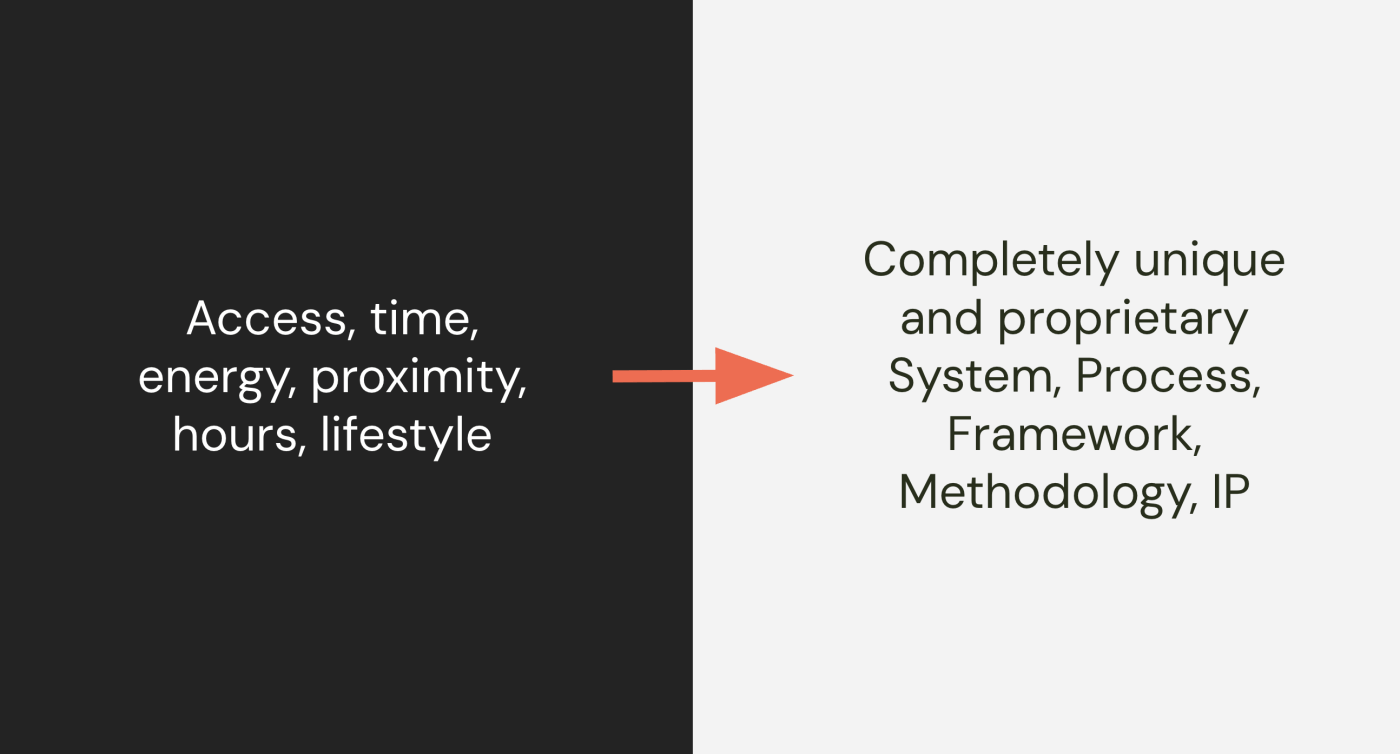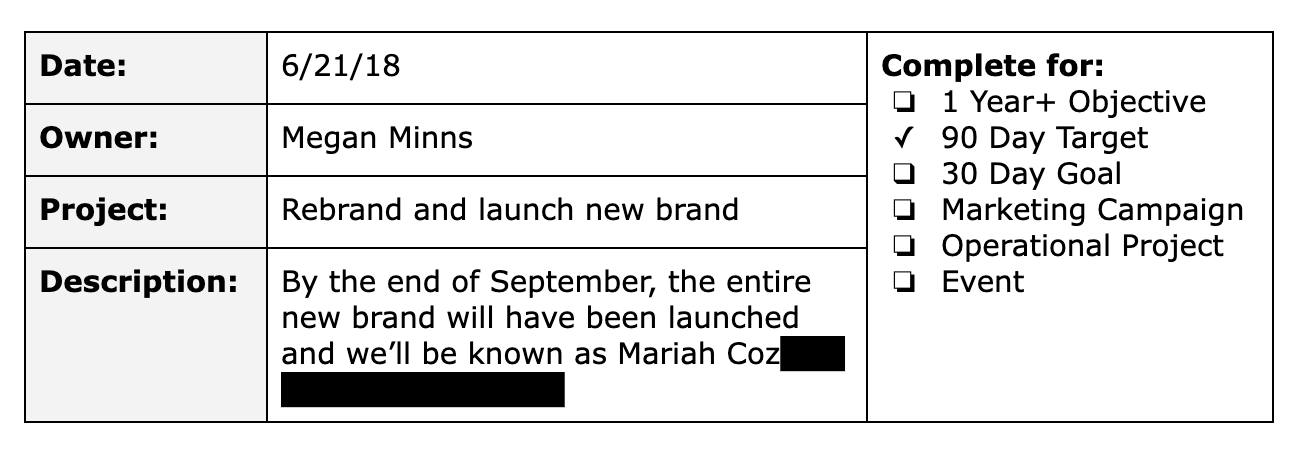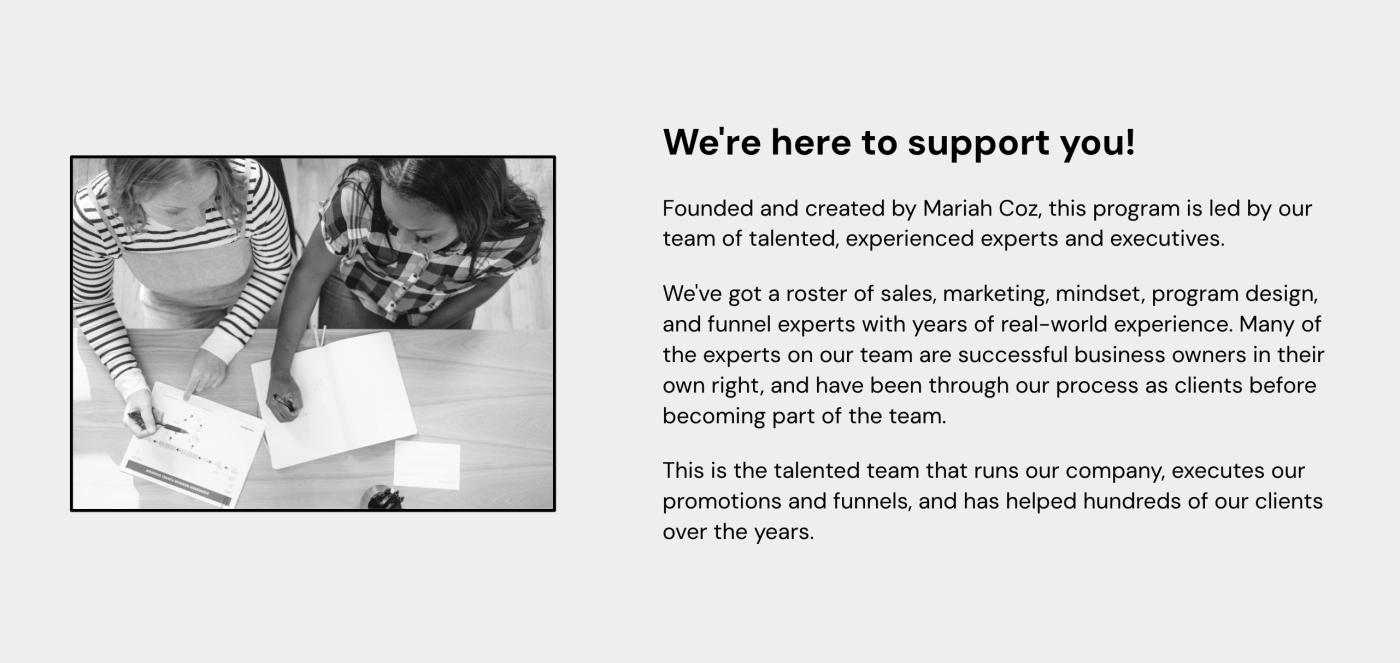As a creator-founder, at some point you've probably gone back and forth about whether or not you should build your business as a company brand name or a personal brand name.
AKA, should you be "Jess Doe" or "The Creator Corner" (just an example).
Last year, there was a lot of talk on social media about how personal brands are unsustainable, the burnout they can cause, and people leaving their personal brand businesses altogether.
Is it the name of the brand that causes those issues, or the structure and design of the business as a whole? I think it can be both.
I'm coming from the perspective of someone who has done both in a really big way. I have tried both of these options at scale (with employees, hundreds of clients, big courses, etc.) I'm speaking from the perspective of an education and content business selling courses, programs, digital products, services, 1:1 consulting, and other "expertise based" offers.
I have seen the good and bad of both options and want to share that experience with you so you can make the right choice for the season of business you're in. Or maybe just help you stop having FOMO, or feeling like you should have chosen "the other path".
At the time of my writing this, I have just rebranded away from a company name brand back to my personal name for this business.

I've made millions as a personal brand name and as a company brand name - and at the end of the day, I don't think it even matters that much which option you go with!
Neither one is a shortcut to success and ultimately, there are so many other more important aspects to building a brand beyond the name you choose to go with.
Maybe at one time there was a belief that personal brands will put a cap on your growth and income. That a personal brand can only take you so far.
But we've seen in the last decade how powerful personal brands can be. Celebrities, influencers, and thought leaders have built hugely profitable businesses either as a personal brand or launched from a personal brand.
The personal cost of that choice, and the merits of turning your personhood into a product to be bought, is a whole other topic we could debate about.
I've talked extensively about the commodification of "you" and how making a person into a product has its own problems and consequences (and what to do instead), in this workshop here.

My Branding Journey
I started this business with a company brand name. Back then, I thought that's what everyone should do from day 1 if they wanted to grow their business and be "professional". Since then, it's gone through a few "eras".
Here's a little snapshot of my timeline:
➡️ 2015 > mid 2018: Company Brand Name
-
I started this business as a company brand name that began with an F (if you've been here since the beginning you may remember!). Now I feel like it was super cringey!
-
One thing that's interesting to note here is that right from the beginning, I always branded my products, courses and programs as their own sub-brands. This concept has always served me well, even as the umbrella brand has shifted.
➡️ Late 2018 > 2022: Personal Brand (Mariah Coz)
-
After months of trying to come up with a new "brand name" to change to, we finally decided to just go with Mariah Coz as the brand name. At the time, I knew that the personal brand era might be temporary. I thought of it as a stop-gap option until I could come up with a new name that felt right.
-
We rebranded to Mariah Coz and that was our brand for about 3+ years.
-
This personal brand scaled with us into the multi-millions, a testament to the fact you can grow with a personal brand especially in this day and age.

➡️ Early 2022 > Early 2024: Company Brand Name (Fearless CEO)
-
At the end of 2021, in a bolt of lightning moment, I finally thought of the right name.
-
At this point, we were a team of around 20 employees, rapidly scaling, and on a growth trajectory if we kept hiring, growing, and forging ahead.
-
My role had shifted dramatically from being the creator and teacher, to being the CEO of a larger company.
When I had a team of 20 employees and I was primarily wearing my CEO hat on a daily basis and less of the Creator-Coach hat, evolving to a company brand name felt necessary.
It was not just me in the business. I was not the only instructor (I wasn't the head coach anymore!). I had a team of wonderful people working closely with my clients, teaching and implementing the frameworks I had created.
It felt a little weird and silly to have "Mariah Coz" all over everything when it was clearly not just the Mariah Coz show anymore - and every person had a huge part to play in the business!
But as my own personal goals shifted, and I downsized my team to get back into the "Creator" seat rather than the CEO seat, it made sense to re-assess.
That brings us to today!
➡️ Early 2024 > ???: Personal Brand (Mariah Coz)
-
I've just rebranded back to a personal brand
-
I thought long and hard for over a year about what I really want the next era of my business to look like, and realized the small, simple personal brand is perfect for me right now
-
My goal isn't to scale a big team or company at this time or to have other people teaching & implementing my frameworks
-
I am also very interested in pushing the boundaries of what a tiny 2-person team and a personal brand can become
Will I ever have a company brand name again? Maybe!
I never say never.
In the future, new "projects" or companies I create can be their own separate brand names and their own things. But my overall brand makes sense as a personal one right now.

Pros and Cons of Personal Brands and Company Brands
When it comes to a Company Brand Name:
The good:
-
You can capture the vibe of your brand in a word(s)
-
You choose who to position as the face of the brand or present as a "collective" company from day one
-
You can build brand equity with the name which can be valuable if you sell it later
The bad:
-
Trademark issues: Even if you aren't using the exact name of an existing brand, when you go to trademark your idea, someone else may object and say it's too similar to theirs and you would have to change it. (I'm not a lawyer, this is not legal advice, go ask your own lawyer about it!)
-
You can spend a lot of money on a brand name, domain and trademark and later realize you don't want to keep growing under that name (Who me? 👀Couldn't be me…😭)
-
I personally outgrow and eventually loathe every brand name I've come up with. I always feel like they are cringey after a few years. This might just be me though.
In terms of a Personal Brand (using your name):
The good:
-
I've had huge opportunities because of the personal brand
-
It's very easy to use your name - no overthinking it, no trademark issues
-
Can shift with your evolving interests and topics over time (easier said than done, though!)
The bad:
-
Can feel like you need to come up with a "tagline" that encompasses EVERYTHING in one sentence (you don't)
-
If you do want to sell in the future, you'd be selling assets but not the entire brand (unless you include your likeness and name rights)
-
Can feel limiting or confusing if you do grow a team in the future and expand beyond your own expertise with contributors
When does a personal brand make sense?
If you're building a business around content creation, courses, coaching, consulting, 1:1 services, writing, blogging, or influencing - a personal brand makes sense.
You can always start with a personal brand, later launch a company brand, and your personal brand becomes the "founder" of a company brand.
One example would be Noah Kagan and AppSumo. Noah is the founder of AppSumo, he has his own book and newsletter, and is the face of the podcast and brand, but the brand has its own name.
Another example is Sam Ovens with Skool - his personal website is simply about him as a person and founder. It links to his business - the platform Skool.
I would love to see other great examples of this if you have some to share.
When does a company name brand make sense?
If you're building an agency, e-commerce shop, SaaS platform, those all make sense to have a company name. Remember, you can leverage your personal social media or personal brand to direct customers to a brand name too.
If you start out as a solo 1:1 service provider (like "Jess Doe Design") you might switch to a brand name later if it turns into an agency.
The reality of a company brand name
You might think that having a company brand name will automatically "solve" some issues you might be having with expectations, boundaries, bandwidth, transfer of trust to team members, etc.
Maybe you've been having an existential crisis about being a human on the internet, blurring the line between person and product (like we talk about here), and you think a company brand name could be the answer!
This is especially relevant in the online course, coaching, digital products world, where the person who started the company is so ingrained in the overall presence of the brand.
-
Your face is in all the photos on the website
-
You make all the social media videos
-
You host the podcast with your voice
-
You teach all the content
-
You host all the group calls
-
You are the established "expert" people want
None of those are a bad thing at all, it's just how most of us start out and then as we evolve, some people think that if they just rebranded to a company name, that would change everything overnight.
You can do all the logistics of having a name brand and still have the perceived "issues" of a personal brand.
If you really want to have a different relationship with your business, you have to go way beyond the brand name. You need to focus on things like:
-
Setting clear expectations about working with you and your business
-
Changing how you talk about your business and working with you in all of your content and marketing (like we teach in this workshop)
-
Clarifying boundaries before, during, and after the enrollment process (in your content, in your sales materials and copy, in your customer onboarding)
-
Having communication protocols in place for clients and team members
For example, when we shifted from the personal brand to Fearless CEO, we intentionally updated our website, webinar, sales pages, etc to reflect the fact that you are working with a full team of people, not just me.

We are always clear about expectations (who hosts what calls, etc), but we started putting the team front and center on the site and materials.
However, the reality of having a company brand name is that unless you do a ton of work and strategy around shifting everything else towards being a more collective company than a personal brand, the name itself isn't going to change much.
If you have the long term vision of being a company brand, with a team, and creating the systems, processes, and communication to do that - then full speed ahead, you should do it!
My experience is that 99% of the time, even if you have a company brand name, most people are going to just find you by googling your name itself and not necessarily the brand. There are tons of people I know run businesses, I know their name, and I can never remember their branded name.
So even if you have a company name as a creator or online education type business, people will still know you by your name and probably refer to you as your name.
Personal Brand vs. Company Brand: What's best for you?
At the end of the day, having built and scaled a company with both a personal brand name and a company brand name, I truly don't think it matters as much as people make it out to, in the majority of cases.
(Of course, if you plan to scale a massive company and exit one day or be acquired or something, go with a company brand if that makes sense).
Even as a personal brand, you can still sell your business or the assets of your business at some point. You could sell your email list, your IP, license your products, your blog and with all its traffic, etc. You can still sell the components of a personal brand to a strategic buyer.
In making your decision about your brand, ask yourself:
-
What are your goals for your business?
-
What gives you the *feeling* of your brand?
-
What do you aspire to become?
-
What era or season are you in now?
-
Are you overthinking this and can you just keep it simple, make a decision and move on? 😁
A Personal Brand with Branded Products
One option would be to build your personal brand, and brand your projects and products as company brand names.
You can launch projects, products, media channels and companies with their own brand identity as an offshoot of your personal brand. You can leverage your personal brand into sales and success for a company name brand.
-
An influencer can launch a beauty brand with a company name
-
An educator or coach can launch a SaaS product with a company name
-
A newsletter writer + blogger can launch an agency with a company name
-
A youtuber can launch a podcast with a co-host and a brand name
Focus on Frameworks
If you do have a personal brand, make sure you are focusing on your frameworks and ideas more than just "time and access to you personally".
You can have a personal brand that still functions in a healthy way by putting the systems, frameworks, ideas, and strategy front and center. It starts in the design of your entire business model, and then translates into how you operate on a day to day basis.
Personal Brands vs. Company Brands
Overall, whether or not you use a personal brand or a company brand name is not going to be the determining factor in your success.
Your success in business is going to be a matter of your messaging, positioning, product quality and delivery, sales skills and client experience. Basically everything other than the name on your website matters more than what you choose to call your brand!